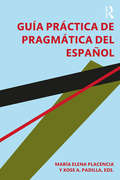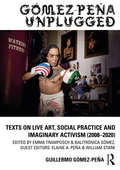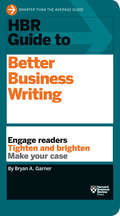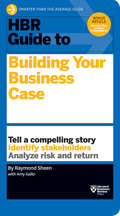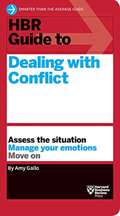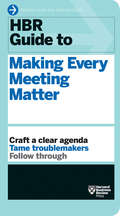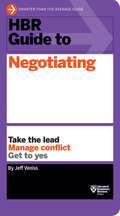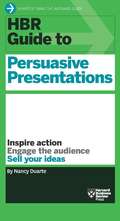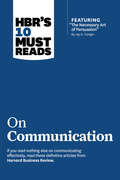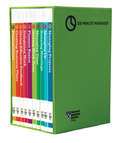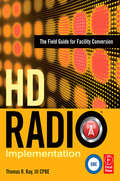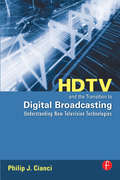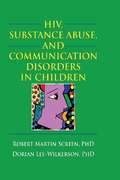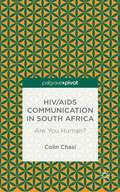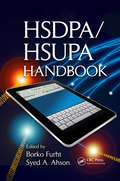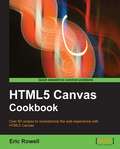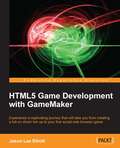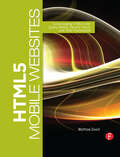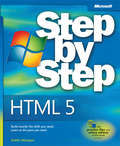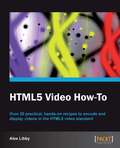- Table View
- List View
Guía para principiantes. Hacer dinero con tu pequeña empresa en las redes sociales
by Alex Nkenchor Uwajeh E2eLas redes sociales ofrecen gran variedad de posibilidades para pequeñas empresas. No solo son una forma barata de dar a conocer tu marca y tus productos, sino que son también una vía excelente para atraer nuevos clientes. La clave del éxito está en entender las diferentes formas de beneficiarte de cada red social.
Guía para sobrevivir al presente: Atrapados en la era digital
by Santiago BilinkisSantiago Bilinkis aborda en su nuevo libro un tema central del presente: cómo esa supercomputadora de bolsillo que es el teléfono celular está afectando nuestras vidas. El impacto de las nuevas tecnologías sobre el cerebro, la educación, el trabajo y el uso del tiempo libre, bajo la mirada del autor de Pasaje al futuro. ¿Qué impacto tienen los aparatos digitales sobre nuestras vidas?¿Qué efectos produce su uso permanente en nuestros cerebros y los de nuestros chicos?¿Por qué pasamos tanto tiempo atrapados en las redes? Basta alzar la vista para corroborarlo: hoy vivimos mirando el celular. Y no es casual: científicos y empresas trabajan intensamente para aprovechar los últimos avances en neurociencia y psicología y profundizar la dependencia con sus sitios y aplicaciones. Con el objetivo de incrementar sus ganancias, las principales compañías de tecnología se encuentran en una guerra por conquistar nuestro tiempo. Y la están ganando: sin siquiera darnos cuenta, desbloqueamos el celular 120 veces al día. Esta es la primera vez que una herramienta, apenas comenzamos a usarla, empieza a usarnos a nosotros. ¿Cuál es el resultado de esta manipulación? Niños enchufados a las pantallas a edades cada vez más tempranas; redes sociales y aplicaciones de citas que vapulean la autoestima de adolescentes y adultos; numerosas personas que, enganchadas en un consumo maratónico de series, reducen al mínimo su descanso. La tentadora promesa de novedades permanentes esconde una trampa detrás de cada app, a menudo a costa de nuestros intereses prioritarios y hasta de nuestra salud. Develando los mecanismos que han convertido al celular en un objeto irresistible, Santiago Bilinkis propone en esta Guía para sobrevivir al presente una manera apasionante de desbloquear nuestra ingenuidad frente a los dispositivos. Y nos ofrece ideas para utilizar los aparatos digitales para conectarnos y vivir experiencias compartidas en vez de encerrarnos en nuestra propia pantalla. En definitiva, nos invita a recuperar el control sobre la vida personal, familiar y laboral, y así disfrutar de los beneficios y las oportunidades que brinda la tecnología sin quedar atrapados en ella.
Guía práctica de pragmática del español
by María Elena Placencia Xose A. PadillaGuía práctica de pragmática del español es un texto introductorio en español. Ofrece introducciones accesibles a una importante variedad de teorías y conceptos imprescindibles en el campo de la pragmática del español. El libro contiene 22 capítulos divididos en seis secciones que cubren: actos de habla, formas de tratamiento, cortesía y descortesía, comunicación y persuasión, discurso digital, metodología en pragmática. Los diferentes capítulos incluyen ejemplos tomados de la comunicación cara a cara y en línea, lecturas (recomendadas y complementarias), y preguntas y actividades que toman como punto de partida diferentes variedades del español y diferentes contextos sociales, culturales y/o políticos en el mundo hispanohablante. Constituye un recurso valioso para estudiantes de pragmática y lingüística hispánica, tanto hablantes nativos como estudiantes de español avanzado.
Gómez-Peña Unplugged: Texts on Live Art, Social Practice and Imaginary Activism (2008–2020)
by Guillermo Gómez-PeñaGómez-Peña Unplugged is an anthology of recent and rewritten classic writings from Guillermo Gómez-Peña, a figure who stands alone as unique and ground-breaking in the history of performance art and as the artistic director of transdisciplinary performance troupe La Pocha Nostra. Throughout this collection, Gómez-Peña tackles literature, theory, pedagogy, activism and live art in an eclectic mix that demonstrates how the process of writing is simultaneously a performative exercise in embodied language. The writing stands as a call for action, utilizing what Gómez-Peña terms “imaginary activism” and “radical citizenship”; it invites the reader to embrace a borderless, polygendered, crossgenerational and race-literate ethos. This timely anthology comes straight from the heart of a troubled Trump-era United States and a crime cartel–ridden Mexico. Artists and writers are prompted to engage in radical performance pedagogy within the civic realm and to think of themselves as public intellectuals and “artivists” participating in the great debates of our times. By encouraging emerging artists and writers to wildly imagine their practice beyond the normative art world and academia, this book is a fundamental read for scholars and students of performance art, political theatre, cultural studies, literature, poetry, activism and race and gender politics. Performance Art, Live or Time-Based Art, Cultural Studies, Experimental Poetry, Multiculturalism, Social Practice, Chicano/Latino/Border Art & Literature, Relational Aesthetics, Public Art, Artivism, Activism, Psychomagic Ritual, Literary Studies, Anthropology, Sociology, Ethnic & Gender Studies, Queer & Women Studies, Post-Colonial Theory, Techno-Art, Cyborgian Studies, Exoticized & Fetishized Identities, Deconstruction Stereotypes & Binaries, Anti-Essentialism, Anti-Nationalism, Radical Citizenship, Anti-Racism, Race & Gender Literacy
HBR Guide to Better Business Writing
by Bryan A. GarnerDON'T LET YOUR WRITING HOLD YOU BACK.When you're fumbling for words and pressed for time, you might be tempted to dismiss good business writing as a luxury. But it's a skill you must cultivate to succeed: You'll lose time, money, and influence if your e-mails, proposals, and other important documents fail to win people over.The HBR Guide to Better Business Writing, by writing expert Bryan A. Garner, gives you the tools you need to express your ideas clearly and persuasively so clients, colleagues, stakeholders, and partners will get behind them. This book will help you: Push past writer's block Grab-and keep-readers' attention Earn credibility with tough audiences Trim the fat from your writing Strike the right tone Brush up on grammar, punctuation, and usage
HBR Guide to Building Your Business Case (HBR Guide Series)
by Raymond Sheen Amy GalloGet your idea off the ground.You've got a great idea that will increase revenue or boost productivity-but how do you get the buy-in you need to make it happen? By building a business case that clearly shows your idea's value. That's not always easy: Maybe you're not sure what kind of data your stakeholders will trust. Or perhaps you're intimidated by number crunching.The HBR Guide to Building Your Business Case, written by project management expert Raymond Sheen, gives you the guidance and tools you need to make a strong case. You'll learn how to: Spell out the business need for your idea Align your case with strategic goals Build the right team to shape and test your idea Calculate the return on investment Analyze risks and opportunities Present your case to stakeholders
HBR Guide to Dealing with Conflict (HBR Guide)
by Amy GalloWhile some of us enjoy a lively debate with colleagues and others prefer to suppress our feelings over disagreements, we all struggle with conflict at work. Every day we navigate an office full of competing interests, clashing personalities, limited time and resources, and fragile egos. Sure, we share the same overarching goals as our colleagues, but we don't always agree on how to achieve them. We work differently. We rub each other the wrong way. We jockey for position. <p><p> How can you deal with conflict at work in a way that is both professional and productive--where it improves both your work and your relationships? You start by understanding whether you generally seek or avoid conflict, identifying the most frequent reasons for disagreement, and knowing what approaches work for what scenarios. Then, if you decide to address a particular conflict, you use that information to plan and conduct a productive conversation. The HBR Guide to Dealing with Conflict will give you the advice you need to:
HBR Guide to Making Every Meeting Matter (HBR Guide Series)
by Harvard Business ReviewMake every minute count.Your calendar is full, and yet your meetings don't always seem to advance your work. Problems often arise with unrealistic or vague agendas, off-track conversations, tuned-out participants who don't know why they're there, and follow-up notes that no one reads-or acts on. Meetings can feel like a waste of time. But when you invest a little energy in preparing yourself and your participants, you'll stay focused, solve problems, gain consensus, and leave each meeting ready to take action.With input from over 20 experts combined with useful checklists, sample agendas, and follow-up memos, the HBR Guide to Making Every Meeting Matter will teach you how to: Set and communicate your meeting's purpose Invite the right people Prepare an achievable agenda Moderate a lively conversation Regain control of a wayward meeting Ensure follow-through without babysitting or haranguingArm yourself with the advice you need to succeed on the job, from a source you trust. Packed with how-to essentials from leading experts, the HBR Guides provide smart answers to your most pressing work challenges.
HBR Guide to Negotiating (HBR Guide Series)
by Jeff WeissForget about the hard bargain.Whether you're discussing the terms of a high-stakes deal, forming a key partnership, asking for a raise, or planning a family event, negotiating can be stressful. One person makes a demand, the other concedes a point. In the end, you settle on a subpar solution in the middle-if you come to any agreement at all.But these discussions don't need to be win-or-lose situations. Written by negotiation expert Jeff Weiss, the HBR Guide to Negotiating provides a disciplined approach to finding a solution that works for everyone involved. Using a seven-part framework, this book delivers tips and advice to move you from a game of concessions and compromises to one of collaboration and creativity, resulting in better outcomes and better working relationships. You'll learn how to: Prepare for your conversation Understand everyone's interests Craft the right message Work with multiple parties Disarm aggressive negotiators Choose the best solution
HBR Guide to Persuasive Presentations
by Nancy DuarteTAKE THE PAIN OUT OF PRESENTATIONS.Terrified of speaking in front of a group? Or simply looking to polish your skills? No matter where you are on the spectrum, this guide will give you the confidence and the tools you need to get results.Written by presentation expert Nancy Duarte, the HBR Guide to Persuasive Presentations will help you: Win over tough crowds Organize a coherent narrative Create powerful messages and visuals Connect with and engage your audience Show people why your ideas matter to them Strike the right tone, in any situation
HBR's 10 Must Reads on Communication (with featured article The Necessary Art of Persuasion, by Jay A. Conger)
by Harvard Business ReviewNEW from the bestselling HBR's 10 Must Reads series.The best leaders know how to communicate clearly and persuasively. How do you stack up?If you read nothing else on communicating effectively, read these 10 articles. We've combed through hundreds of articles in the Harvard Business Review archive and selected the most important ones to help you express your ideas with clarity and impact-no matter what the situation.Leading experts such as Deborah Tannen, Jay Conger, and Nick Morgan provide the insights and advice you need to: Pitch your brilliant idea-successfully Connect with your audience Establish credibility Inspire others to carry out your vision Adapt to stakeholders' decision-making styles Frame goals around common interests Build consensus and win supportLooking for more Must Read articles from Harvard Business Review? Check out these titles in the popular series:HBR's 10 Must Reads: The EssentialsHBR's 10 Must Reads on CollaborationHBR's 10 Must Reads on InnovationHBR's 10 Must Reads on LeadershipHBR's 10 Must Reads on Making Smart DecisionsHBR's 10 Must Reads on Managing YourselfHBR's 10 Must Reads on Strategic MarketingHBR's 10 Must Reads on Teams
HBR's 10 Must Reads on Communication (with featured article The Necessary Art of Persuasion, by Jay A. Conger)
by Harvard Business ReviewNEW from the bestselling HBR's 10 Must Reads series.The best leaders know how to communicate clearly and persuasively. How do you stack up?If you read nothing else on communicating effectively, read these 10 articles. We've combed through hundreds of articles in the Harvard Business Review archive and selected the most important ones to help you express your ideas with clarity and impact-no matter what the situation.Leading experts such as Deborah Tannen, Jay Conger, and Nick Morgan provide the insights and advice you need to: Pitch your brilliant idea-successfully Connect with your audience Establish credibility Inspire others to carry out your vision Adapt to stakeholders' decision-making styles Frame goals around common interests Build consensus and win supportLooking for more Must Read articles from Harvard Business Review? Check out these titles in the popular series:HBR's 10 Must Reads: The EssentialsHBR's 10 Must Reads on CollaborationHBR's 10 Must Reads on InnovationHBR's 10 Must Reads on LeadershipHBR's 10 Must Reads on Making Smart DecisionsHBR's 10 Must Reads on Managing YourselfHBR's 10 Must Reads on Strategic MarketingHBR's 10 Must Reads on Teams
HBR's 10 Must Reads on Communication (with featured article The Necessary Art of Persuasion, by Jay A. Conger)
by Harvard Business ReviewNEW from the bestselling HBR's 10 Must Reads series.The best leaders know how to communicate clearly and persuasively. How do you stack up?If you read nothing else on communicating effectively, read these 10 articles. We've combed through hundreds of articles in the Harvard Business Review archive and selected the most important ones to help you express your ideas with clarity and impact-no matter what the situation.Leading experts such as Deborah Tannen, Jay Conger, and Nick Morgan provide the insights and advice you need to: Pitch your brilliant idea-successfully Connect with your audience Establish credibility Inspire others to carry out your vision Adapt to stakeholders' decision-making styles Frame goals around common interests Build consensus and win supportLooking for more Must Read articles from Harvard Business Review? Check out these titles in the popular series:HBR's 10 Must Reads: The EssentialsHBR's 10 Must Reads on CollaborationHBR's 10 Must Reads on InnovationHBR's 10 Must Reads on LeadershipHBR's 10 Must Reads on Making Smart DecisionsHBR's 10 Must Reads on Managing YourselfHBR's 10 Must Reads on Strategic MarketingHBR's 10 Must Reads on Teams
HBR's 10 Must Reads on Communication (with featured article The Necessary Art of Persuasion, by Jay A. Conger)
by Harvard Business ReviewNEW from the bestselling HBR's 10 Must Reads series.The best leaders know how to communicate clearly and persuasively. How do you stack up?If you read nothing else on communicating effectively, read these 10 articles. We've combed through hundreds of articles in the Harvard Business Review archive and selected the most important ones to help you express your ideas with clarity and impact-no matter what the situation.Leading experts such as Deborah Tannen, Jay Conger, and Nick Morgan provide the insights and advice you need to: Pitch your brilliant idea-successfully Connect with your audience Establish credibility Inspire others to carry out your vision Adapt to stakeholders' decision-making styles Frame goals around common interests Build consensus and win supportLooking for more Must Read articles from Harvard Business Review? Check out these titles in the popular series:HBR's 10 Must Reads: The EssentialsHBR's 10 Must Reads on CollaborationHBR's 10 Must Reads on InnovationHBR's 10 Must Reads on LeadershipHBR's 10 Must Reads on Making Smart DecisionsHBR's 10 Must Reads on Managing YourselfHBR's 10 Must Reads on Strategic MarketingHBR's 10 Must Reads on Teams
HBR's 20-Minute Manager Boxed Set
by Harvard Business ReviewAnthology containing: Presentations (20-Minute Manager Series) Creating Business Plans (20-Minute Manager Series) Giving Effective Feedback (20-Minute Manager Series) Delegating Work (20-Minute Manager Series) Finance Basics (20-Minute Manager Series) Getting Work Done (20-Minute Manager Series) Managing Time (20-Minute Manager Series) Running Meetings (20-Minute Manager Series) Managing Up (20-Minute Manager Series) Managing Projects (20-Minute Manager Series)
HD Radio Implementation: The Field Guide for Facility Conversion
by Thomas R. RayTake the mystery out of the conversion to HD Radio transmission with this hands-on approach to implementation. HD Radio Implementation will take this new subject and make it familiar. With details and descriptions of what HD Radio is, what changes are necessary and unnecessary in the studio, STL path and audio chain, it takes this new technology and makes it friendly so you can successfully convert your station. After reading this book, you will come away with an understanding of how to implement HD Radio for your facility with a minimum of hassles. It is intended to be read and understood by the station Engineer, but the General Manager, Program Director and Operations Director will be able to understand the nature of HD Radio and how it will affect their facility.
HDTV and the Transition to Digital Broadcasting: Understanding New Television Technologies
by Philip J. CianciHDTV and the Transition to Digital Broadcasting bridges the gap between non-technical personnel (management and creative) and technical by giving you a working knowledge of digital television technology, a clear understanding of the challenges of HDTV and digital broadcasting, and a scope of the ramifications of HDTV in the consumer space. Topics include methodologies and issues in HD production and distribution, as well as HDTV's impact on the future of the media business. This book contains sidebars and system diagrams that illustrate examples of broadcaster implementation of HD and HD equipment. Additionally, future trends including the integration of broadcast engineering and IT, control and descriptive metadata, DTV interactivity and personalization are explored.
HIV, Substance Abuse, and Communication Disorders in Children
by R. Dennis Shelby Robert M. ScreenMake sure every child gets a chance to be heardHIV, Substance Abuse and Communication Disorders in Children examines the language problems of young children from special populations. Essential as a textbook for graduate and upper-level undergraduate studies and as a reference resource, this unique book presents up-to-date research and compelling case studies that illustrate how prenatal exposure to drugs, alcohol, and HIV can affect a child in utero and continue to handicap its development after birth. Each chapter includes discussion threads and review questions to promote critical thinking and clinical problem-solving skills in the classroom.HIV, Substance Abuse and Communication Disorders in Children looks at the negative impact a mother&’s lifestyle practices can have on her developing child with a nod toward the significant prevalence of HIV and substance abuse in today&’s society. Some estimates place the number of infants born after prenatal exposure to illicit drugs as three-quarters of a million-every year. When alcohol is added, the figure rises to more than 1 million. This powerful book focuses specifically on the serious consequences of alcohol, marijuana, cocaine, and crack cocaine abuse, including poor language development and speech delays, limited vocabulary, the inability to make their needs known, poor articulation, the inability to follow commands, limited expressive language skills, and the inability to understand the real meaning of words and generalize them. And of the nearly 5,000 children in the United States living with AIDS, almost all will struggle with speech production and communication disorders as the disease affects their brain, spinal cord, and central nervous system. HIV, Substance Abuse and Communication Disorders in Children examines: the effect of drugs on the brain pregnancy and drug use trends common drugs of abuse Kosakoff&’s syndrome fetal alcohol syndrome (FAS) among Native Americans and African Americans neurologic sequellae speech and language intervention rehabilitation considerations treatment and family counseling and much moreHIV, Substance Abuse and Communication Disorders in Children is essential for graduate and undergraduate students working with language disorders in special populations.
HIV/AIDS Communication in South Africa: Are You Human?
by Colin ChasiEven though sub-Saharan Africa is the region most affected by HIV/AIDS in the world, no new theories have been discovered, and questions about life and death are ignored. This book uses certain selected communication practices to offer the foundations of an African theory of communication, applicable to the crisis of HIV/AIDS.
HSDPA/HSUPA Handbook
by Borko Furht Syed A. AhsonHigh Speed Packet Access (HSPA) is a collection of two mobile telephony protocols, High Speed Downlink Packet Access (HSDPA) and High Speed Uplink Packet Access (HSUPA). Allowing networks based on the Universal Mobile Telecommunications System to achieve data rates of several megabits per second, these powerful protocols are ideal for applications
HTML5 Canvas Cookbook
by Eric RowellWritten in cookbook style, this book offers a wide array of techniques for building HTML5 Canvas applications. Each recipe contains step-by-step instructions followed by analysis of what was done in each task and other useful information. The book is designed so that you can read it chapter by chapter, or you can look at the list of recipes and refer to them in no particular order. This book is geared towards web developers who are familiar with HTML and JavaScript. It is written for both beginners and seasoned HTML5 developers with a good working knowledge of JavaScript.
HTML5 Game Development with GameMaker
by Jason Lee ElliottThe book is a friendly but explosive reference for all skill levels, with several action packed projects. You will develop the ability to build games from scratch with a comprehensive practical tutorial guide. This book is assured to boost your skill set to another level.This book is for anyone with a passion to create fun and action packed web browser games using GameMaker Studio. This intuitive practical guide appeals to both beginners and advanced users wanting to create and release online games to share with the world, using the powerful GameMaker tool.
HTML5 Mobile Websites: Turbocharging HTML5 with jQuery, Sencha Touch, and Other Frameworks
by Matthew DavidBuild HTML5-powered mobile web experiences with the aid of development frameworks that speed the development of Native App-like experiences. Build on your foundation of HTML and JavaScript with a complete understanding of the different mobile Web browser technologies. You get carefully detailed techniques that are illustrated in full color so you can leverage the Web technologies unique to each mobile browser, apply frameworks such as Sencha Touch to rapidly build out your designs, and design techniques expressly suited for tablet devices. Projects provide hands-on practice and code is provided on the companion website, www.visualizetheweb.com.
HTML5 Step by Step
by Faithe WempenExperience learning made easy--and quickly teach yourself how to create Web pages with the HTML5 specification. With Step by Step, you set the pace--building and practicing the skills you need, just when you need them! Use a division-based layout to structure your Web pages Include menu bars and hyperlinks for clear navigation Apply colors, font sizes, and other formatting with CSS Add graphics, sound, and video to your pages Use the Canvas tag to render visual images on the fly Build user-input forms with buttons, boxes, and menus Your Step by Step digital content includes: All the book's practice files--ready to download and put to work. See "Using the Practice Files," inside. Fully searchable online edition of this book--with unlimited access on the Web. Free online account required; see inside book.
HTML5 Video How-to
by Alex LibbyFilled with practical, step-by-step instructions and clear explanations for the most important and useful tasks. Get the job done and learn as you go. This book takes the How-to series approach to help you learn most important tasks through recipes. This book is great for developers new to the HTML5 Video standard, and who are looking to get a good grounding in how to use the new format. It's assumed that you will have some experience in HTML and jQuery already, as well as being familiar with embedding videos using current "old school" methods, such as Windows Media Player. Readers are expected to have one or more videos available, which will be used during the exercises within this book.


